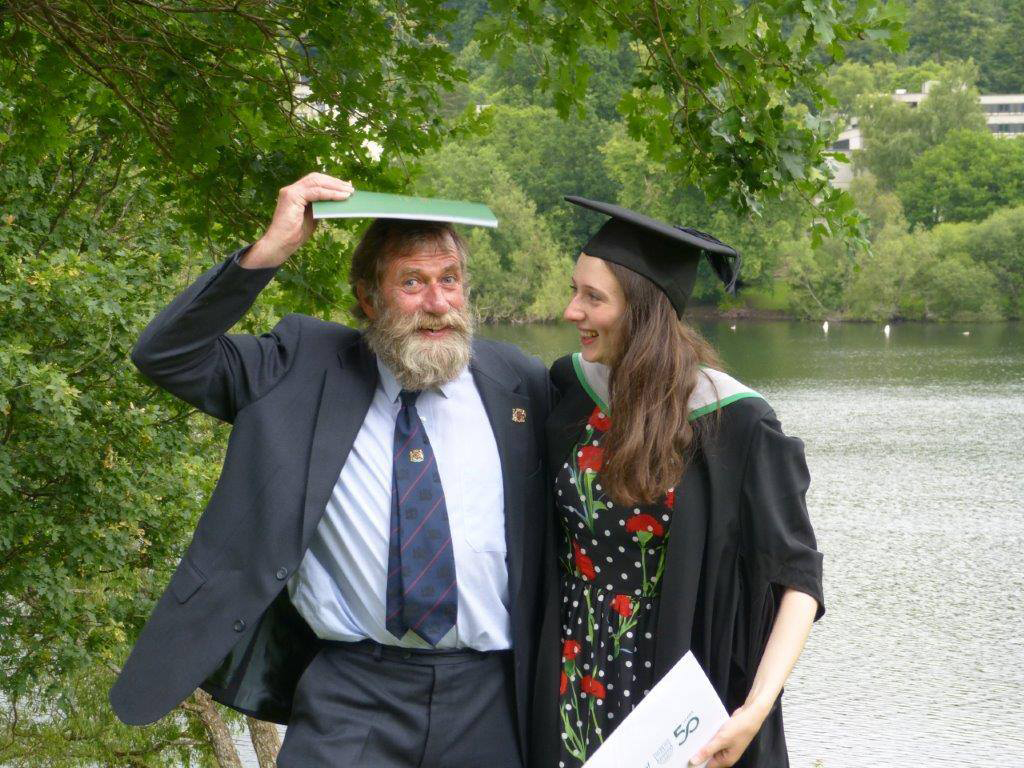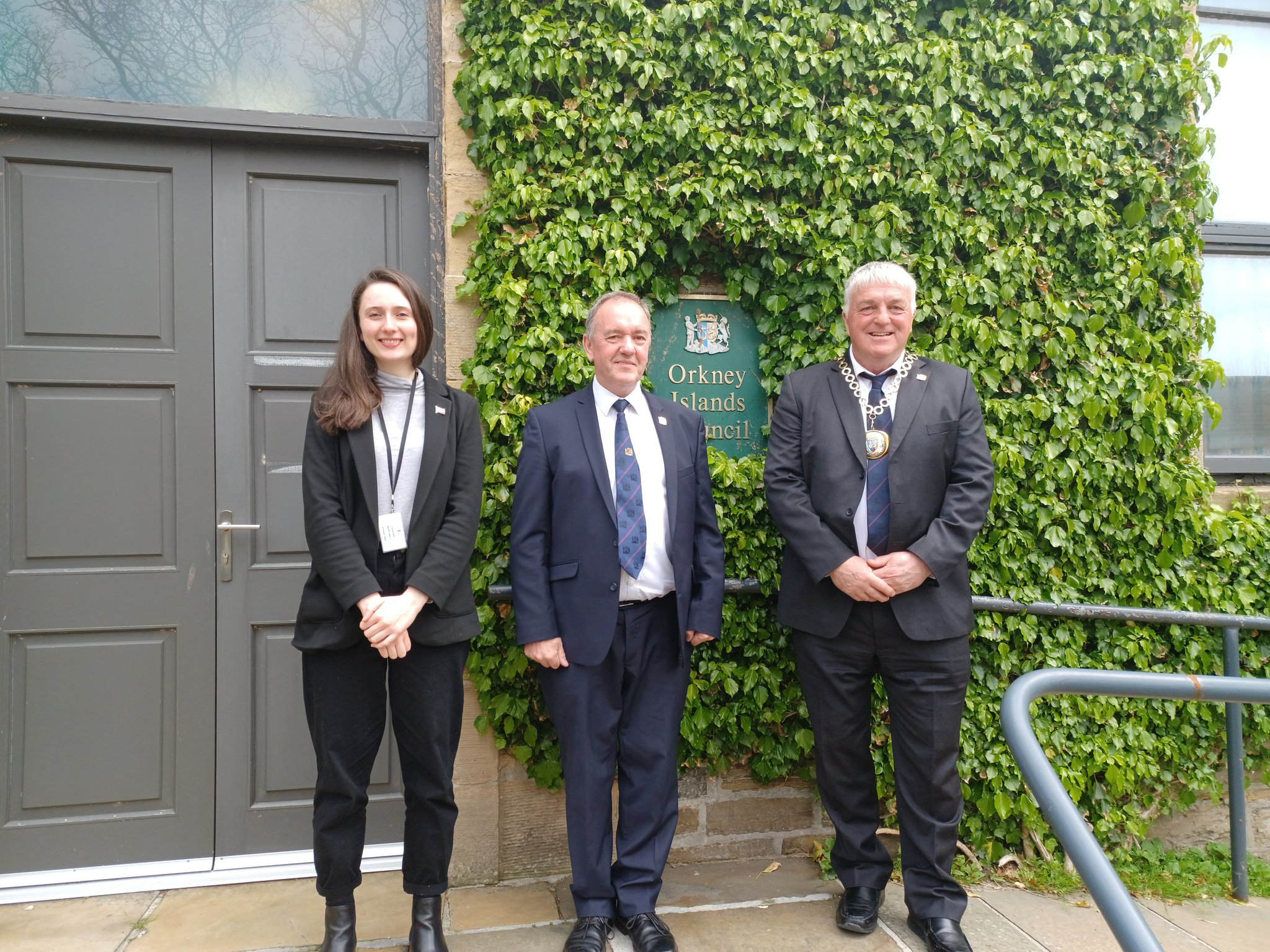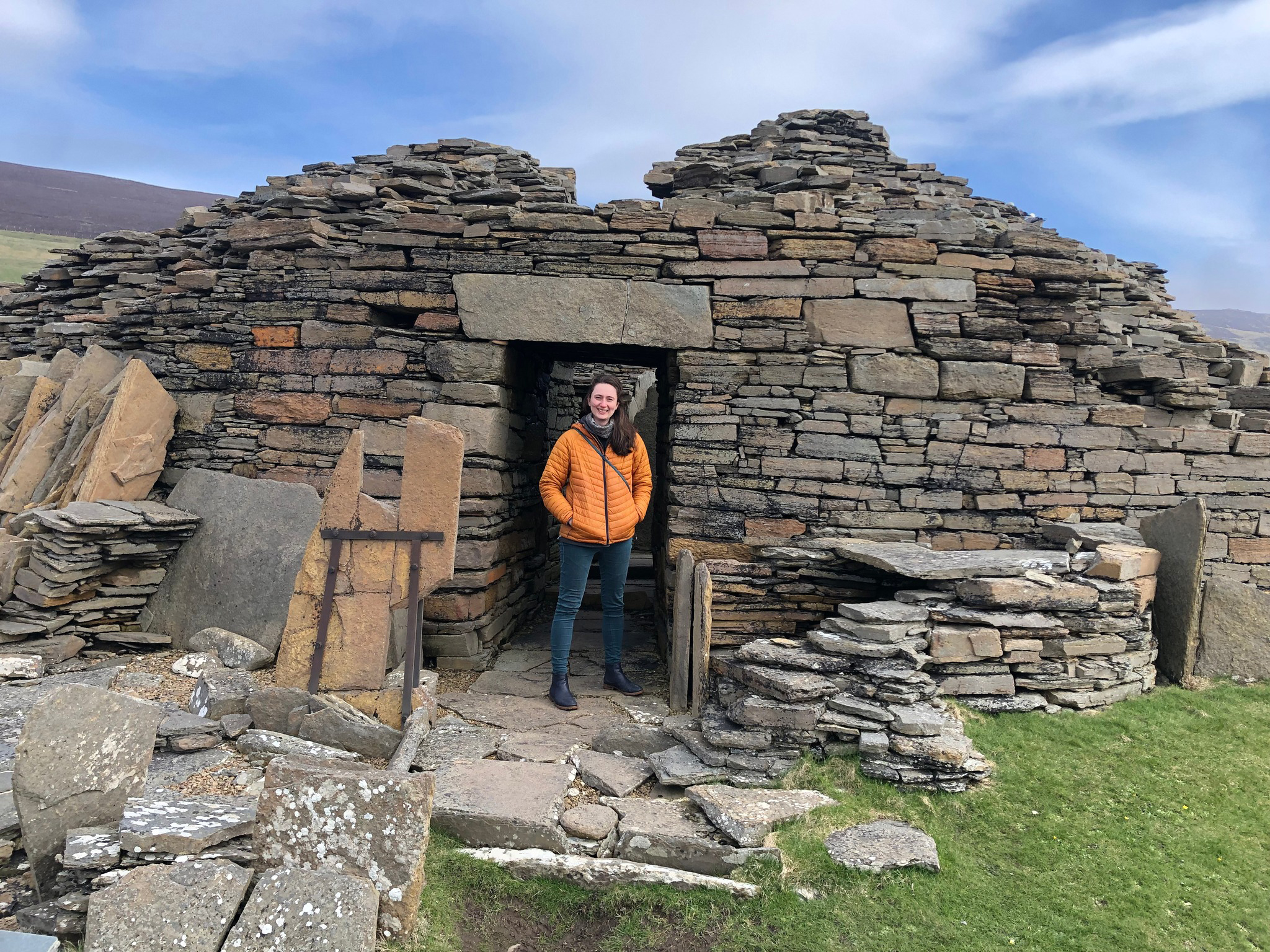Orkney Council leader: I stood to replace my dad, now it's my duty to serve
When Heather Woodbridge’s father knew he was going to pass away he had one big ask of his daughter: to finish the job he had started. As a local councillor for the Orkney North Isles ward, Kevin Woodbridge had been making the case for better transport provision since being elected in 2017. But knowing he was going to die with his goal not yet achieved, he asked his daughter if she would consider taking his place.
“My father had a short illness and passed away in 2020,” Woodbridge says. “When we spoke about it he suggested that there would be a by-election because he knew what was coming and he asked if I’d be interested in standing. That was really astute. He knew me so well and had really observed it would be something I might enjoy and something I might be good at. I was working for the Scottish Wildlife Trust at the time and was really involved in community events and in sustainability, conservation, heritage and culture. He saw that. When he did pass away I took a bit of time to think then decided I really wanted to finish his term for him.”
Woodbridge’s father passed away in April 2020 and in October of that year she was elected as his successor, taking 70 per cent of the by-election vote to become one of three representatives for the vast ward. When the term that had been begun by her father came to an end in May 2022, Woodbridge stood again, and again was the favourite at the ballot box, winning 43 per cent of the vote to be elected in the first round. Then, earlier this year, after incumbent James Stockan stood down, she was named council leader, becoming the first woman to hold that role in Orkney and, at 29, the youngest person to head a local authority in Scotland. Standing, she says, felt like her duty.
 Heather Woodbridge with her late father, Kevin
Heather Woodbridge with her late father, Kevin
“I was James’s deputy before so I knew what his job was and really understood what drove him and what he put into it,” she says. “He was so generous with his knowledge and very encouraging. He announced he was standing down in January. I knew a bit before other people and it was very much a case of was I willing to step up to that because I was the natural person to do so. I didn’t ever shadow him, we went into meetings together, and when you’re seeking stability for a council that’s in the middle of discussions that offered a level of continuity. I was ready to do the role and had to stand out of duty.”
The discussions she and Stockan had been jointly involved in immediately before he stepped down largely revolved around setting the council’s budget for the year ahead. Like all local authorities, Orkney is facing tough financial times, with Stockan warning in December last year that it was in an “incredibly fragile” position and that the reality it was facing had “never been so bleak and black”. The council, which with the exception of Greens Kristopher Leask and John Ross Scott is made up entirely of independents, had intended to raise council tax by 10 per cent in the current year but agreed to abide by the Scottish Government’s controversial freeze in return for a £1.1m uplift to its settlement. But, to meet the £100m-plus cost of the services it provides, the council has been dipping into its reserves at a rate of £20m a year and the situation is no longer sustainable, Woodbridge says.
“We have a challenge in terms of our settlement from the Scottish Government,” she explains. “We know there’s not a lot of money, that’s fine, but it has to be distributed fairly and there needs to be recognition that we need a different kind of support. Things work differently on islands and we have very island-specific challenges. For me, I don’t feel Edinburgh is very far away but I’m quite willing to travel so it doesn’t feel like much of a barrier, but I do think we’re far away from a shared understanding of what it’s like to live on an island when the power’s off and the boat isn’t coming.”
 Woodbrodge with former Orkney leader James Stockan (centre) and council convener Graham Bevan
Woodbrodge with former Orkney leader James Stockan (centre) and council convener Graham Bevan
Woodbridge knows only too well what it’s like to live under such circumstances, having spent her whole life, bar a year in Norway studying music and four years at the University of Stirling studying science, on the family’s North Ronaldsay croft. The upbringing she describes is idyllic, with her and her younger brother being given the run of the 75-inhabitant island, where the family kept a number of the beach-dwelling, seaweed-eating sheep North Ronaldsay is famed for. Her father, who had moved from Buckinghamshire to Orkney in the late 70s, was the North Ronaldsay GP and, along with her mother Alison, who came on holiday in the 80s and never left, set up and ran the North Ronaldsay Bird Observatory. It was, Woodbridge says, “a wonderful place to grow up” and the family was very much “embedded in that community and culture”.
Some of the hard realities of island living were brought home to the family in the mid-90s, though, when Woodbridge graduated from primary to secondary school and some difficult decisions had to be made.
“For me, when I went to high school, I had to go to Kirkwall Grammar School,” Woodbridge says. “Other islands have junior high schools, which means you can stay at home for longer, but if you live in North Ronaldsay you have to go and board when you’re 11 or 12. I flew to school every day for a while because I wasn’t ready to go to the halls. A daily commute like that was not ideal, but when I was in second year my father took a job at Balfour Hospital in Kirkwall. My mother kept the croft in North Ronaldsay and my father took shifts in the hospital and stayed there with my brother and me during the week then we all went home at the weekend. It made sense for our family.”
Though she describes it as normal – she did not, after all, know any different – the experience gave Woodbridge a taste of the way that public services that are easily accessed by people living on mainland Scotland have to be moulded around the peculiarities of island life. She also saw this in the way her father worked prior to taking the Balfour Hospital job. While on the one hand his role as North Ronaldsay GP was ostensibly an easy one given the tiny population he served, on the other it was remarkably tough given he was the sole healthcare professional that tiny population had to rely on.
 Kevin Woodbridge during his days as the GP for North Ronaldsay | Jim Richardson/National Geographic
Kevin Woodbridge during his days as the GP for North Ronaldsay | Jim Richardson/National Geographic
“He was the on-call medical person for North Ronaldsay,” Woodbridge says. “It was a really interesting situation because there were no other nurses or healthcare staff at all. The majority of the things he was dealing with were probably pretty small, like standard prescriptions. At the same time, it was very much a case of us not having easy access to the hospital or healthcare and if there was an emergency people would be waiting five or 10 hours for a pre-hospital transfer. You need to have someone who’s really equipped to handle that pre-hospital treatment.”
And then, of course, there are the ferries. As an independent, Woodbridge had no party line to toe when she put her name forward for election so was free to choose the ticket she stood on. Given the promise she had made to her father, and given what he had been focused on throughout his working life, her pledge revolved around steering improvements in healthcare and transportation. Both are pressing and both impact every single person living in her ward, but the ferry situation is, she says, getting close to untenable.
“Everyone is talking about ferries, quite rightly,” she says. “The ferries in Orkney are all of a similar age and we’ve just retired one that’s 50 years old. We need a plan to solve that. We’re the smallest local authority in Scotland and we have many, many islands – we need help to solve these problems. We’ve met with the deputy first minister and the transport minister and we’ve made quite good progress – we’ve got a commitment from the Scottish Government to fund the business case for Orkney’s outlying ferry fleet. For the Scottish Government to underwrite that is very, very welcome. It’s the first time they’ve assisted us in a business case proposal and it’s a huge first step.”
But a business case is one thing, replacing a nine-strong fleet of ferries is another and none of this can be achieved without a fair funding settlement. And, while Orkney Islands Council has accepted the council tax freeze for the current year, Woodbridge says it is imperative that the government considers altering its allocation model moving forward.
 Woodbridge in her Orkney ward
Woodbridge in her Orkney ward
“It’s not a perfect funding formula,” she says. “There are challenges and there are lots of examples of why it isn’t working, partly because we have a lot of directed spend from the Scottish Government, for example in the capital grant. What we can choose to spend it on is shifting over time and that’s probably accentuated in an island community where we need a creative approach – we might not fit in with [the government’s] nice neat descriptions and islands have to flex to fit with the funding.
“I fully support the Verity House Agreement [which saw the government last year agree to a ‘more collaborative approach’ to delivering local services]. It’s important because it’s something you can hold the government to. It’s important to have that understanding and something to work towards. With the council tax freeze the feeling was that that was not in the gift of the Scottish Government. It’s a devolved power to local authorities and it’s up to us what we do. There are aspirations to review how council tax works but we need to have that conversation. That’s what I’d be interested in going forward.”
Closer to home, while the job as leader means Woodbridge is spending more and more time in Kirkwall each week, she still lives with her mother on the croft in North Ronaldsay, where the bird observatory is still going strong. Wildlife and the natural environment remain a passion for her although, after initially trying to juggle two roles, she gave up her position at Scottish Wildlife Trust to focus on council duties. Though many local councillors see their position as part-time, in Orkney treating it as anything less than full-time would not be good enough, she says.
“In my view, and this is personal, when I was a backbencher I viewed the role as full-time due to the complexities of the communities we represent and the travel [Woodbridge’s ward takes in 14 separate islands],” she says. “If you’re living on one of those islands travelling is a challenge but the issues the community faces are so much more essential to life – the basic infrastructure you need for running your business or getting your kids to school is so challenging that it’s a different role to that of a mainland councillor. They might be dealing with streets that haven’t been swept or bins that need emptied. Those things are important, but if you’re talking about kids who can’t get to school or there not being a nurse on an island if you get sick it’s a different level of need.”
Holyrood Newsletters
Holyrood provides comprehensive coverage of Scottish politics, offering award-winning reporting and analysis: Subscribe